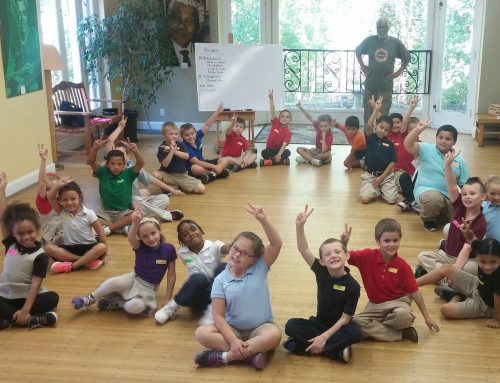Picture this: A group of 15 youth are seated in an open-classroom setting, cell phones are nowhere to be seen, and all the students are fully engaged in the topic being presented by the woman at the front of the room.
This is what you’ll find each Friday afternoon between 11:30 – 12:30 when Melita Carter, Youth Development Facilitator, visits Simon Youth Academy. Her lesson always begins with a quick review of what was talked about the last lesson, with students leading the charge. This particular morning they’re reviewing self-esteem and the meaning behind affirmations for yourself and others. Each student takes a moment to say one positive thing about themselves.
“I’m nice.”
“I have good hair.”
“I am confident.”
Unprompted, they ask to be able to do the same for their classmates.
“This right here is my best friend and when I’m feeling down she always brings me up.”
“I really like your glasses.”
“You always make people laugh.”
Melita is piloting a new program centered around Economic Justice at Simon Youth Academy and the students are fully committed to learning what she has to say. She asks them to demonstrate that they remember the concepts they’ve discussed recently and one girl tentatively explains institutional oppression as she remembers it, apologizing as she finishes up her statement. Melita is quick to say “Don’t ever apologize for speaking up.”
And then with no preamble, no introduction, Melita launches into a spoken word piece entitled “Are You Listening?” and the students are clearly captivated by not only the remarkable talent, but the message the piece is presenting about the issues that are affecting our youth today. One that sticks out to them is the constant pressure to spend their money on shoes, phones, clothes and other material objects when it could be directed elsewhere.
“What you said about J’s (Jordans) [stuck out]. People buy the same shoes in a different color every year. They’re getting played. And they don’t even have a car to get to work.”
The group then starts to make a list of the brands that youth and adults spend their money most on: Apple, Nike, Coach, Polo, Pelle Pelle, Victoria’s Secret. It’s clear that they could add to the list all afternoon if given the chance. Melita asks them to give an average price on items bought from these companies and she writes them next to the brand’s name. At the end, they’ve created a list of material items costing around $5,500. Let’s mention here that the youth got a quick math lesson in, adding up the item’s prices without the use of a calculator.
This is only the beginning of the lesson and the kids are leaning forward in their seats, eager to ask questions and even more eager to hear what’s next. She goes on to talk about how big corporations use some of this money to pay lobbyists to advocate for policies & practices that will continue to benefit the corporations while hurting the very people who are buying their wares.
Someone shouts out, “Money is power.”
They get a history lesson on some of the policies. They get a government lesson on lobbying. They aren’t asleep in their seats. They are taking notes.
Two minutes are left in her time and Melita asks them to use their critical thinking skills in the next week to consider what they don’t have in their communities that they need and what could be done with the $5,500 simulated shopping spree they went on earlier.
She leaves them with this question, “Where else can you put your money to build and support your community?”
Her time is up, but the teens protest her ending, pointing out that they don’t have lunch until 12:45 so they should be able to continue the lesson. One girl says “We learn something new every single time Miss Melita comes.” The teacher agrees. Melita takes questions for another 15 minutes with students fully committed to the conversation at hand.
When their time is really up another student says, “This is stuff I’ve never heard. I feel like you’re a resource we’ve never had.”
And they’re right.
Thank you, Melita, for sharing your light, knowledge, and skills with our youth.

